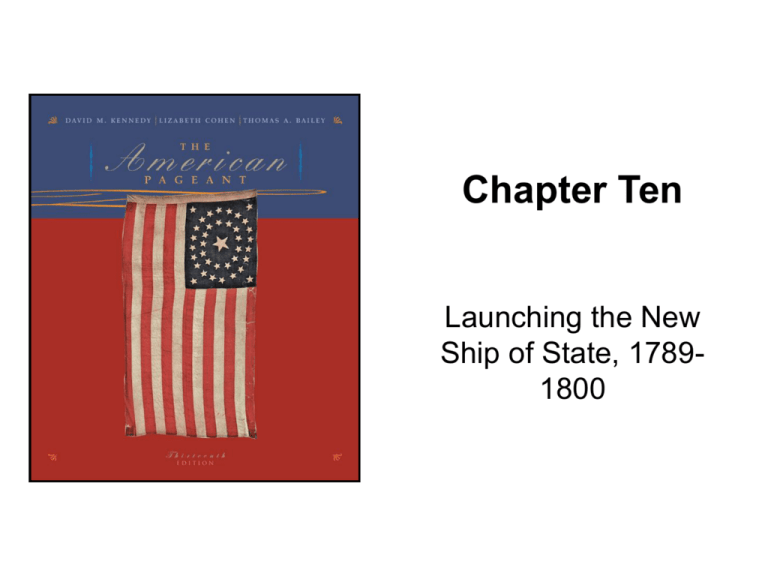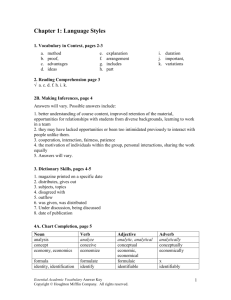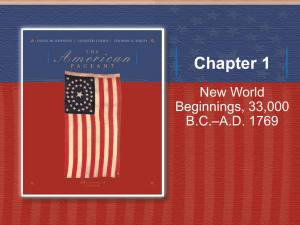
Chapter Ten
Launching the New
Ship of State, 17891800
Kennedy, The American Pageant
Chapter 10
The first ten amendments to the
United States Constitution are
commonly known as
1. the separation of powers.
2. the Bill of Rights.
3. freedom of religion, freedom of speech, and
freedom of the press.
4. the necessary and proper clauses.
Copyright © Houghton Mifflin Company. All rights reserved.
10-2
Kennedy, The American Pageant
Chapter 10
The first ten amendments to the
United States Constitution are
commonly known as
2. the Bill of Rights.
Hint: See page 192.
Copyright © Houghton Mifflin Company. All rights reserved.
10-3
Kennedy, The American Pageant
Chapter 10
Secretary of the Treasury Alexander
Hamilton believed that federal fiscal
policies should be designed to favor
1. the wealthy.
2. farmers and western frontiersmen.
3. the states.
4. wage-earning ordinary citizens.
Copyright © Houghton Mifflin Company. All rights reserved.
10-4
Kennedy, The American Pageant
Chapter 10
Secretary of the Treasury Alexander
Hamilton believed that federal fiscal
policies should be designed to favor
1. the wealthy.
Hint: See pages 193–194.
Copyright © Houghton Mifflin Company. All rights reserved.
10-5
Kennedy, The American Pageant
Chapter 10
Hamilton raised the first revenues to
finance the federal government
through
1. a national sales tax.
2. making a profit on the issuance of federal
currency and bonds.
3. an income tax and a tax on interstate commerce.
4. a tax (tariff) on imports and an excise tax on items
like whiskey.
Copyright © Houghton Mifflin Company. All rights reserved.
10-6
Kennedy, The American Pageant
Chapter 10
Hamilton raised the first revenues to
finance the federal government
through
4. a tax (tariff) on imports and an excise tax on items
like whiskey.
Hint: See pages 194–195.
Copyright © Houghton Mifflin Company. All rights reserved.
10-7
Kennedy, The American Pageant
Chapter 10
Alexander Hamilton believed that the
Bank of the United States was
constitutional because of
1. the president’s inherent powers to administer
federal finances.
2. the “necessary and proper” clause of the
Constitution.
3. the Constitution’s stipulation that the federal
government had excusive powers to create
money and guarantee its value.
4. the clause declaring Congress’s power to protect
copyrights and patent protections.
Copyright © Houghton Mifflin Company. All rights reserved.
10-8
Kennedy, The American Pageant
Chapter 10
Alexander Hamilton believed that the
Bank of the United States was
constitutional because of
2. the “necessary and proper” clause of the
Constitution.
Hint: See page 195.
Copyright © Houghton Mifflin Company. All rights reserved.
10-9
Kennedy, The American Pageant
Chapter 10
The crushing of the Whiskey
Rebellion was significant because
1. the rebels were in danger of creating a
revolutionary Pennsylvania federal government
that might secede from the Union.
2. Hamilton’s financial plan could not succeed
without the revenue from the tax on alcohol.
3. it demonstrated that the new federal government
had the power and will to defeat challenges to its
authority.
4. it demonstrated that the new U.S. army and
marines were capable of fighting a guerilla war in
the West.
Copyright © Houghton Mifflin Company. All rights reserved.
10-10
Kennedy, The American Pageant
Chapter 10
The crushing of the Whiskey
Rebellion was significant because
3. it demonstrated that the new federal government
had the power and will to defeat challenges to its
authority.
Hint: See page 196.
Copyright © Houghton Mifflin Company. All rights reserved.
10-11
Kennedy, The American Pageant
Chapter 10
The first American political parties
arose out of the conflict over
1. the suppression of the Whiskey Rebellion.
2. Thomas Jefferson’s opposition to Hamilton’s
creation of the Bank of the United States.
3. the conflict over British support for American
Indian attacks in the West.
4. the legitimacy of John Adams’s presidency after
the close, contested election of 1796.
Copyright © Houghton Mifflin Company. All rights reserved.
10-12
Kennedy, The American Pageant
Chapter 10
The first American political parties
arose out of the conflict over
2. Thomas Jefferson’s opposition to Hamilton’s
creation of the Bank of the United States.
Hint: See page 196.
Copyright © Houghton Mifflin Company. All rights reserved.
10-13
Kennedy, The American Pageant
Chapter 10
Regarding the French Revolution,
the Jeffersonian Republicans
basically believed
1. that despite its excesses it was a necessary
victory for the cause of human liberty.
2. that the overthrow of the king was legitimate but
that the revolutionary terror discredited the whole
event.
3. that the United States should join with France in a
revolutionary alliance to overthrow the world’s
remaining monarchies.
4. that the revolution was legitimate but that its antiChristian dimensions made it unacceptable to
Americans.
Copyright © Houghton Mifflin Company. All rights reserved.
10-14
Kennedy, The American Pageant
Chapter 10
Regarding the French Revolution,
the Jeffersonian Republicans
basically believed
1. that despite its excesses it was a necessary
victory for the cause of human liberty.
Hint: See page 199.
Copyright © Houghton Mifflin Company. All rights reserved.
10-15
Kennedy, The American Pageant
Chapter 10
George Washington’s Neutrality
Proclamation of 1793 indicated that
the fundamental basis of American
foreign policy would be
1. isolationism and realism.
2. commitment to international security and global
peacemaking.
3. a commitment to international alliances and the
balance of power.
4. a willingness to commit American forces abroad
wherever the cause of liberty was threatened.
Copyright © Houghton Mifflin Company. All rights reserved.
10-16
Kennedy, The American Pageant
Chapter 10
George Washington’s Neutrality
Proclamation of 1793 indicated that
the fundamental basis of American
foreign policy would be
1. isolationism and realism.
Hint: See page 199.
Copyright © Houghton Mifflin Company. All rights reserved.
10-17
Kennedy, The American Pageant
Chapter 10
The Sedition Act of 1798 declared
that
1. anyone criticizing the president or other federal
officials could be fined or imprisoned.
2. foreign immigrants in the United States could be
held in prison without the writ of habeas corpus.
3. those who engaged in open rebellion against the
federal government could be attacked by the U.S.
army as enemies of the United States.
4. that the Jeffersonian Republican Party was illegal
until the war with France was settled.
Copyright © Houghton Mifflin Company. All rights reserved.
10-18
Kennedy, The American Pageant
Chapter 10
The Sedition Act of 1798 declared
that
1. anyone criticizing the president or other federal
officials could be fined or imprisoned.
Hint: See page 205.
Copyright © Houghton Mifflin Company. All rights reserved.
10-19
Kennedy, The American Pageant
Chapter 10
Thomas Jefferson’s “Kentucky
resolutions” essentially declared that
1. western states like Kentucky should not remain
part of the federal Union.
2. individual states had the right to “nullify” or refuse
to obey unconstitutional federal laws.
3. state Supreme Courts should be the final judges
of what laws were or were not constitutional.
4. that the federal government had not power or right
to tax individuals under the Constitution.
Copyright © Houghton Mifflin Company. All rights reserved.
10-20
Kennedy, The American Pageant
Chapter 10
Thomas Jefferson’s “Kentucky
resolutions” essentially declared that
2. individual states had the right to “nullify” or refuse
to obey unconstitutional federal laws.
Hint: See pages 206–207.
Copyright © Houghton Mifflin Company. All rights reserved.
10-21



